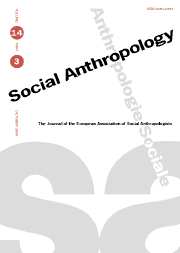No CrossRef data available.
Agir et parler dans les campagnes Merina des annees soixante
Published online by Cambridge University Press: 31 October 2002
Abstract
The article is a contribution to an ethnology of communication and an attempt to combine ordinary and formal acts of language so as to recapture the ethos or art of living by which Merina peasants form their harmonious ideal of mutual understanding, enticing humans to self control and to refrain from expressing pronounced disagreements. Central to them is the idea that any activity (of speech or action), any relation to the external world is loaded with danger.
Society here shares the conviction that the inherent insufficiencies of humankind condemn it to commit mistakes, thus inciting it to prudence. An examination of blames and prohibitions and an analysis of the various recourses to divination and to astrology complete the study of agrarian and ritual calendars. One discovers here a whole phenomenology of previson and prevention mobilised to alleviate unfavourable consequences and to withdraw from chance a destiny rendered more previsible.
In the venture, the author mobilises a whole recession of ethnographies borrowed from published sources and direct observation, joining to them essays on the language of maxims and proverbs – ohabolana – displayed as poetry during contests and challenges – hain teny – (Paulhan), contrasting daily, or ordinary, modes of expression to oratory speeches mobilising the authority of a whole social hierarchy as in the marriage kabari. The use of a sacred language along with the presence of multiple layers of reality shows that, contrary to what the modern universe of values experiences, social – socio-emotional – issues have precedence over operational finalities: a philosophy of the golden mean through which the Merina demonstrate how their common sensical forms of knowledge and anxiety derive from daily pragmatics themselves being constituted by social relationships.
- Type
- Research Article
- Information
- Copyright
- © 2002 European Association of Social Anthropologists


